- Home
- George MacDonald
Lilith Page 6
Lilith Read online
Page 6
“Does it live on the dead,” I wondered, “and is it unable to hurt the living? If they scent their prey and come out, why do they leave me unharmed?”
I know now it was that the moon paralysed them.
All the night through as I walked, hideous creatures, no two alike, threatened me. In some of them, beauty of colour enhanced loathliness of shape: one large serpent was covered from head to distant tail with feathers of glorious hues.
I became at length so accustomed to their hurtless menaces that I fell to beguiling the way with the invention of monstrosities, never suspecting that I owed each moment of life to the staring moon. Though hers was no primal radiance, it so hampered the evil things, that I walked in safety. For light is yet light, if but the last of a countless series of reflections! How swiftly would not my feet have carried me over the restless soil, had I known that, if still within their range when her lamp ceased to shine on the cursed spot, I should that moment be at the mercy of such as had no mercy, the centre of a writhing heap of hideousness, every individual of it as terrible as before it had but seemed! Fool of ignorance, I watched the descent of the weary, solemn, anxious moon down the widening vault above me, with no worse uneasiness than the dread of losing my way—where as yet I had indeed no way to lose.
I was drawing near the hills I had made my goal, and she was now not far from their sky-line, when the soundless wallowing ceased, and the burrow lay motionless and bare. Then I saw, slowly walking over the light soil, the form of a woman. A white mist floated about her, now assuming, now losing to reassume the shape of a garment, as it gathered to her or was blown from her by a wind that dogged her steps.
She was beautiful, but with such a pride at once and misery on her countenance that I could hardly believe what yet I saw. Up and down she walked, vainly endeavouring to lay hold of the mist and wrap it around her. The eyes in the beautiful face were dead, and on her left side was a dark spot, against which she would now and then press her hand, as if to stifle pain or sickness. Her hair hung nearly to her feet, and sometimes the wind would so mix it with the mist that I could not distinguish the one from the other; but when it fell gathering together again, it shone a pale gold in the moonlight.
Suddenly pressing both hands on her heart, she fell to the ground, and the mist rose from her and melted in the air. I ran to her. But she began to writhe in such torture that I stood aghast. A moment more and her legs, hurrying from her body, sped away serpents. From her shoulders fled her arms as in terror, serpents also. Then something flew up from her like a bat, and when I looked again, she was gone. The ground rose like the sea in a storm; terror laid hold upon me; I turned to the hills and ran.
I was already on the slope of their base, when the moon sank behind one of their summits, leaving me in its shadow. Behind me rose a waste and sickening cry, as of frustrate desire—the only sound I had heard since the fall of the dead butterfly; it made my heart shake like a flag in the wind. I turned, saw many dark objects bounding after me, and made for the crest of a ridge on which the moon still shone. She seemed to linger there that I might see to defend myself. Soon I came in sight of her, and climbed the faster.
Crossing the shadow of a rock, I heard the creatures panting at my heels. But just as the foremost threw himself upon me with a snarl of greedy hate, we rushed into the moon together. She flashed out an angry light, and he fell from me a bodiless blotch. Strength came to me, and I turned on the rest. But one by one as they darted into the light, they dropped with a howl; and I saw or fancied a strange smile on the round face above me.
I climbed to the top of the ridge: far away shone the moon, sinking to a low horizon. The air was pure and strong. I descended a little way, found it warmer, and sat down to wait the dawn.
The moon went below, and the world again was dark.
CHAPTER XI. THE EVIL WOOD
I fell fast asleep, and when I woke the sun was rising. I went to the top again, and looked back: the hollow I had crossed in the moonlight lay without sign of life. Could it be that the calm expanse before me swarmed with creatures of devouring greed?
I turned and looked over the land through which my way must lie. It seemed a wide desert, with a patch of a different colour in the distance that might be a forest. Sign of presence, human or animal, was none—smoke or dust or shadow of cultivation. Not a cloud floated in the clear heaven; no thinnest haze curtained any segment of its circling rim.
I descended, and set out for the imaginable forest: something alive might be there; on this side of it could not well be anything!
When I reached the plain, I found it, as far as my sight could go, of rock, here flat and channeled, there humped and pinnacled—evidently the wide bed of a vanished river, scored by innumerable water-runs, without a trace of moisture in them. Some of the channels bore a dry moss, and some of the rocks a few lichens almost as hard as themselves. The air, once “filled with pleasant noise of waters,” was silent as death. It took me the whole day to reach the patch,—which I found indeed a forest—but not a rudiment of brook or runnel had I crossed! Yet through the glowing noon I seemed haunted by an aural mirage, hearing so plainly the voice of many waters that I could hardly believe the opposing testimony of my eyes.
The sun was approaching the horizon when I left the river-bed, and entered the forest. Sunk below the tree-tops, and sending his rays between their pillar-like boles, he revealed a world of blessed shadows waiting to receive me. I had expected a pine-wood, but here were trees of many sorts, some with strong resemblances to trees I knew, others with marvellous differences from any I had ever seen. I threw myself beneath the boughs of what seemed a eucalyptus in blossom: its flowers had a hard calyx much resembling a skull, the top of which rose like a lid to let the froth-like bloom-brain overfoam its cup. From beneath the shadow of its falchion-leaves my eyes went wandering into deep after deep of the forest.
Soon, however, its doors and windows began to close, shutting up aisle and corridor and roomier glade. The night was about me, and instant and sharp the cold. Again what a night I found it! How shall I make my reader share with me its wild ghostiness?
The tree under which I lay rose high before it branched, but the boughs of it bent so low that they seemed ready to shut me in as I leaned against the smooth stem, and let my eyes wander through the brief twilight of the vanishing forest. Presently, to my listless roving gaze, the varied outlines of the clumpy foliage began to assume or imitate—say rather SUGGEST other shapes than their own. A light wind began to blow; it set the boughs of a neighbour tree rocking, and all their branches aswing, every twig and every leaf blending its individual motion with the sway of its branch and the rock of its bough. Among its leafy shapes was a pack of wolves that struggled to break from a wizard’s leash: greyhounds would not have strained so savagely! I watched them with an interest that grew as the wind gathered force, and their motions life.
Another mass of foliage, larger and more compact, presented my fancy with a group of horses’ heads and forequarters projecting caparisoned from their stalls. Their necks kept moving up and down, with an impatience that augmented as the growing wind broke their vertical rhythm with a wilder swaying from side to side. What heads they were! how gaunt, how strange!—several of them bare skulls—one with the skin tight on its bones! One had lost the under jaw and hung low, looking unutterably weary—but now and then hove high as if to ease the bit. Above them, at the end of a branch, floated erect the form of a woman, waving her arms in imperious gesture. The definiteness of these and other leaf masses first surprised and then discomposed me: what if they should overpower my brain with seeming reality? But the twilight became darkness; the wind ceased; every shape was shut up in the night; I fell asleep.
It was still dark when I began to be aware of a far-off, confused, rushing noise, mingled with faint cries. It grew and grew until a tumult as of gathering multitudes filled the wood. On all sides at once the sounds drew nearer; the spot where I lay seemed the centre of a commot
ion that extended throughout the forest. I scarce moved hand or foot lest I should betray my presence to hostile things.
The moon at length approached the forest, and came slowly into it: with her first gleam the noises increased to a deafening uproar, and I began to see dim shapes about me. As she ascended and grew brighter, the noises became yet louder, and the shapes clearer. A furious battle was raging around me. Wild cries and roars of rage, shock of onset, struggle prolonged, all mingled with words articulate, surged in my ears. Curses and credos, snarls and sneers, laughter and mockery, sacred names and howls of hate, came huddling in chaotic interpenetration. Skeletons and phantoms fought in maddest confusion. Swords swept through the phantoms: they only shivered. Maces crashed on the skeletons, shattering them hideously: not one fell or ceased to fight, so long as a single joint held two bones together. Bones of men and horses lay scattered and heaped; grinding and crunching them under foot fought the skeletons. Everywhere charged the bone-gaunt white steeds; everywhere on foot or on wind-blown misty battle-horses, raged and ravened and raved the indestructible spectres; weapons and hoofs clashed and crushed; while skeleton jaws and phantom-throats swelled the deafening tumult with the war-cry of every opinion, bad or good, that had bred strife, injustice, cruelty in any world. The holiest words went with the most hating blow. Lie-distorted truths flew hurtling in the wind of javelins and bones. Every moment some one would turn against his comrades, and fight more wildly than before, THE TRUTH! THE TRUTH! still his cry. One I noted who wheeled ever in a circle, and smote on all sides. Wearied out, a pair would sit for a minute side by side, then rise and renew the fierce combat. None stooped to comfort the fallen, or stepped wide to spare him.
The moon shone till the sun rose, and all the night long I had glimpses of a woman moving at her will above the strife-tormented multitude, now on this front now on that, one outstretched arm urging the fight, the other pressed against her side. “Ye are men: slay one another!” she shouted. I saw her dead eyes and her dark spot, and recalled what I had seen the night before.
Such was the battle of the dead, which I saw and heard as I lay under the tree.
Just before sunrise, a breeze went through the forest, and a voice cried, “Let the dead bury their dead!” At the word the contending thousands dropped noiseless, and when the sun looked in, he saw never a bone, but here and there a withered branch.
I rose and resumed my journey, through as quiet a wood as ever grew out of the quiet earth. For the wind of the morning had ceased when the sun appeared, and the trees were silent. Not a bird sang, not a squirrel, mouse, or weasel showed itself, not a belated moth flew athwart my path. But as I went I kept watch over myself, nor dared let my eyes rest on any forest-shape. All the time I seemed to hear faint sounds of mattock and spade and hurtling bones: any moment my eyes might open on things I would not see! Daylight prudence muttered that perhaps, to appear, ten thousand phantoms awaited only my consenting fancy.
In the middle of the afternoon I came out of the wood—to find before me a second net of dry water-courses. I thought at first that I had wandered from my attempted line, and reversed my direction; but I soon saw it was not so, and concluded presently that I had come to another branch of the same river-bed. I began at once to cross it, and was in the bottom of a wide channel when the sun set.
I sat down to await the moon, and growing sleepy, stretched myself on the moss. The moment my head was down, I heard the sounds of rushing streams—all sorts of sweet watery noises. The veiled melody of the molten music sang me into a dreamless sleep, and when I woke the sun was already up, and the wrinkled country widely visible. Covered with shadows it lay striped and mottled like the skin of some wild animal. As the sun rose the shadows diminished, and it seemed as if the rocks were re-absorbing the darkness that had oozed out of them during the night.
Hitherto I had loved my Arab mare and my books more, I fear, than live man or woman; now at length my soul was athirst for a human presence, and I longed even after those inhabitants of this alien world whom the raven had so vaguely described as nearest my sort. With heavy yet hoping heart, and mind haunted by a doubt whether I was going in any direction at all, I kept wearily travelling “north-west and by south.”
CHAPTER XII. FRIENDS AND FOES
Coming, in one of the channels, upon what seemed a little shrub, the outlying picket, I trusted, of an army behind it, I knelt to look at it closer. It bore a small fruit, which, as I did not recognise it, I feared to gather and eat. Little I thought that I was watched from behind the rocks by hundreds of eyes eager with the question whether I would or would not take it.
I came to another plant somewhat bigger, then to another larger still, and at length to clumps of a like sort; by which time I saw that they were not shrubs but dwarf-trees. Before I reached the bank of this second branch of the river-bed, I found the channels so full of them that it was with difficulty I crossed such as I could not jump. In one I heard a great rush, as of a multitude of birds from an ivied wall, but saw nothing.
I came next to some large fruit-bearing trees, but what they bore looked coarse. They stood on the edge of a hollow, which evidently had once been the basin of a lake. From the left a forest seemed to flow into and fill it; but while the trees above were of many sorts, those in the hollow were almost entirely fruit-bearing.
I went a few yards down the slope of grass mingled with moss, and stretched myself upon it weary. A little farther down stood a tiny tree full of rosiest apples no bigger than small cherries, its top close to my hand; I pulled and ate one of them. Finding it delicious, I was in the act of taking another, when a sudden shouting of children, mingled with laughter clear and sweet as the music of a brook, startled me with delight.
“He likes our apples! He likes our apples! He’s a good giant! He’s a good giant!” cried many little voices.
“He’s a giant!” objected one.
“He IS rather big,” assented another, “but littleness isn’t everything! It won’t keep you from growing big and stupid except you take care!”
I rose on my elbow and stared. Above and about and below me stood a multitude of children, apparently of all ages, some just able to run alone, and some about twelve or thirteen. Three or four seemed older. They stood in a small knot, a little apart, and were less excited than the rest. The many were chattering in groups, declaiming and contradicting, like a crowd of grown people in a city, only with greater merriment, better manners, and more sense.
I gathered that, by the approach of my hand to a second apple, they knew that I liked the first; but how from that they argued me good, I did not see, nor wondered that one of them at least should suggest caution. I did not open my mouth, for I was afraid of frightening them, and sure I should learn more by listening than by asking questions. For I understood nearly all they said—at which I was not surprised: to understand is not more wonderful than to love.
There came a movement and slight dispersion among them, and presently a sweet, innocent-looking, lovingly roguish little fellow handed me a huge green apple. Silence fell on the noisy throng; all waited expectant.
“Eat, good giant,” he said.
I sat up, took the apple, smiled thanks, and would have eaten; but the moment I bit into it, I flung it far away.
Again rose a shout of delight; they flung themselves upon me, so as nearly to smother me; they kissed my face and hands; they laid hold of my legs; they clambered about my arms and shoulders, embracing my head and neck. I came to the ground at last, overwhelmed with the lovely little goblins.
“Good, good giant!” they cried. “We knew you would come! Oh you dear, good, strong giant!”
The babble of their talk sprang up afresh, and ever the jubilant shout would rise anew from hundreds of clear little throats.
Again came a sudden silence. Those around me drew back; those atop of me got off and began trying to set me on my feet. Upon their sweet faces, concern had taken the place of merriment.
“Get up, good
giant!” said a little girl. “Make haste! much haste! He saw you throw his apple away!”
Before she ended, I was on my feet. She stood pointing up the slope. On the brow of it was a clownish, bad-looking fellow, a few inches taller than myself. He looked hostile, but I saw no reason to fear him, for he had no weapon, and my little friends had vanished every one.
He began to descend, and I, in the hope of better footing and position, to go up. He growled like a beast as he turned toward me.
Reaching a more level spot, I stood and waited for him. As he came near, he held out his hand. I would have taken it in friendly fashion, but he drew it back, threatened a blow, and held it out again. Then I understood him to claim the apple I had flung away, whereupon I made a grimace of dislike and a gesture of rejection.
He answered with a howl of rage that seemed to say, “Do you dare tell me my apple was not fit to eat?”
“One bad apple may grow on the best tree,” I said.
Whether he perceived my meaning I cannot tell, but he made a stride nearer, and I stood on my guard. He delayed his assault, however, until a second giant, much like him, who had been stealing up behind me, was close enough, when he rushed upon me. I met him with a good blow in the face, but the other struck me on the back of the head, and between them I was soon overpowered.
They dragged me into the wood above the valley, where their tribe lived—in wretched huts, built of fallen branches and a few stones. Into one of these they pushed me, there threw me on the ground, and kicked me. A woman was present, who looked on with indifference.

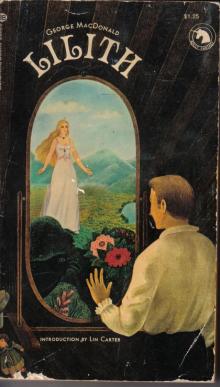 Lilith: A Romance
Lilith: A Romance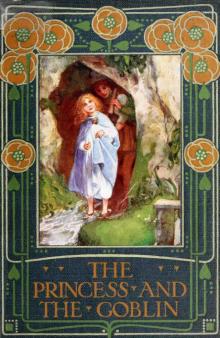 The Princess and the Goblin
The Princess and the Goblin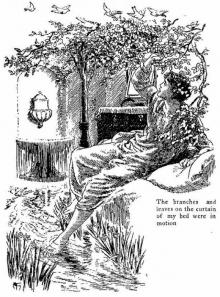 Phantastes: A Faerie Romance for Men and Women
Phantastes: A Faerie Romance for Men and Women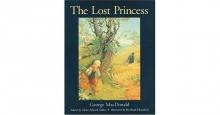 A Double Story
A Double Story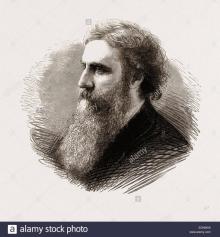 St. George and St. Michael
St. George and St. Michael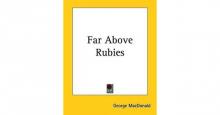 Far Above Rubies
Far Above Rubies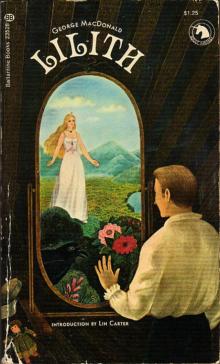 Lilith
Lilith